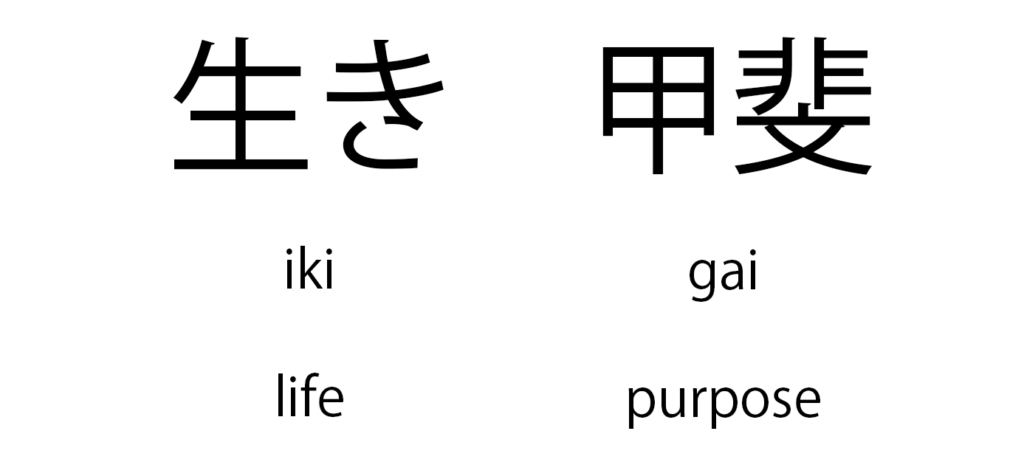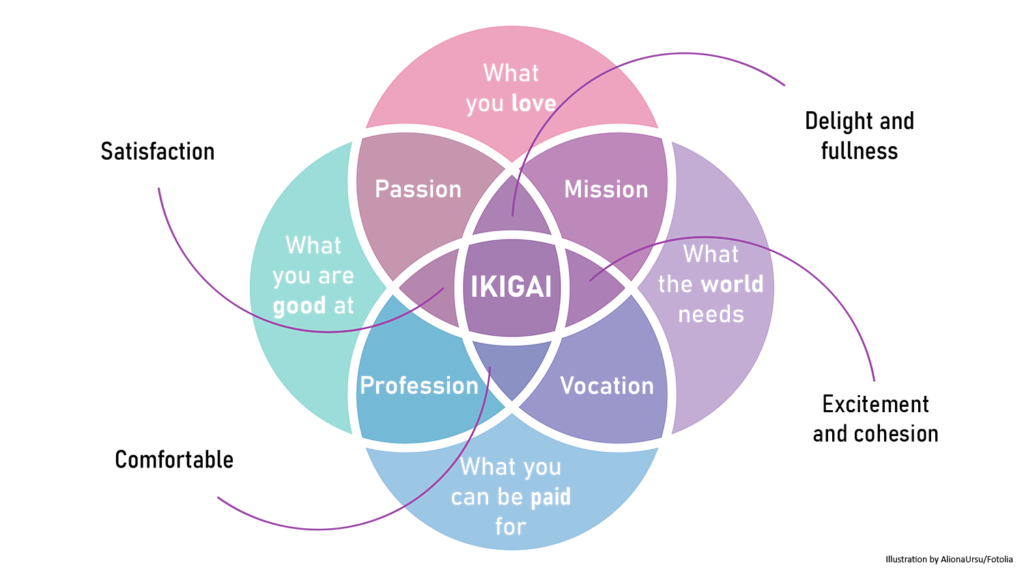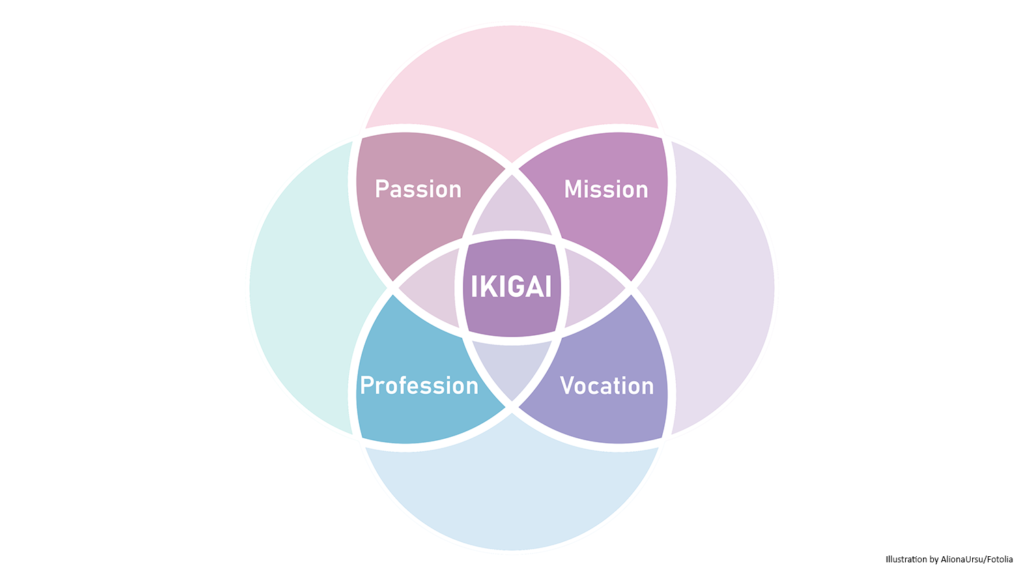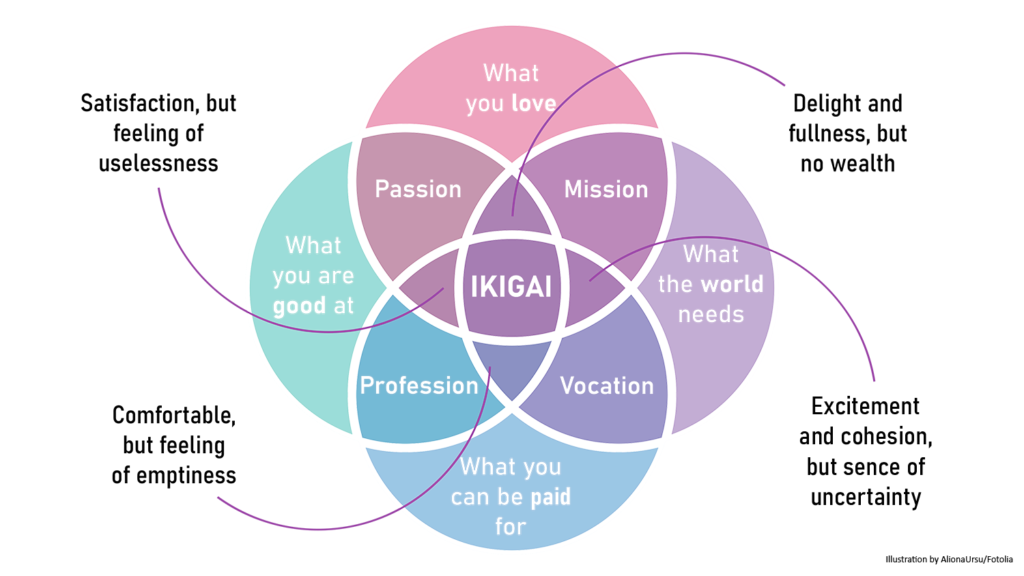The question of the meaning of life, of fulfillment in what we do, both in our private lives and in our work, is increasingly coming to the fore. While on the one hand a proper work-life balance is considered the measure of all things, I firmly believe that with meaningful activity the transitions between work and private life become more fluid. Less work-life balance and more work-life integration.
Do what you burn for, and you can’t burn out.
We have motivation from within and feel joy instead of frustration. We are no longer so exhausted and can enjoy life and what it has to offer much more than simply recovering. What is more difficult for many is to find that purpose. And then to integrate it, as far as we can, into our lives and live it. It is of special importance that this search for your meaning does not tire you out so much, that you don’t feel like it anymore and give up prematurely or that you put the goal of living the meaning of your life on such a high pedestal that you can’t reach this goal. This only leads to unnecessary negative feelings, which really do not have to be. It is more like that the path is the goal.
This article is an introduction to the Japanese philosophy of Ikigai. It’s a little longer and detailed enough that you can start finding your Ikigai almost immediately. It doesn’t have to be perfect from the start. Look at it playfully, start openly and without expectation pressure into the occupation with the right questions. And above all, don’t expect to have all the answers immediately at the end of the article. What you get here is a very powerful tool. This is the beginning of a long journey and it is important to enjoy walking the path. To be happy about new findings and to keep getting a little closer to your goal.
Table of Content
The Origin of Ikigai
Ikigai and Values
The 4 Pillars of Ikigai
The first Connection
The second Connection
Let’s Talk a few Words about Money
Where is the origin of Ikigai and how can you benefit from it today?
The Japanese Concept of Ikigai helps you to approach the topic in a structured way and to get the most important questions, the answers to which will help you to find your “Reason for being”, your reason why you are here. Your purpose in life, which brings you joy and for which you like to get up every morning. You can also use the questions to further sharpen your personal meaning of life. We evolve every day. Asking ourselves the most important questions about our lives at certain intervals helps us not to lose ourselves
There is no direct translation to th eword Ikigai into any other language. Also, there are a few interpretations possible. I had a conversation with a professional translator and we came to the conclusion, that the most common translation for Ikigai means life reason or also life purpose or more sonorous “purpose of life”.

This philosophy is about finding something that gives meaning to one’s life and makes it fulfilling and satisfying. Above all, it helps to deal with the essential and sometimes uncomfortable questions that occupy us all and to get clarity.
- Why are you alive?
- What are you burning for?
- What is the meaning of your life?
Ikigai tells the story of the centenarians and why they are so old and content. The term Ikigai goes back a long way in the history of Japan and over the years, it has taken on many meanings. Ikigai was originally a philosophy of finding its meaning in strengthening the social community for the benefit of all. In the post-war years of the last century until the 1980s, this is also the meaning of Ikigai that has been predominantly passed down from Japan. Especially from the 1960s to the 1980s, Japan’s own focus was once again increasingly placed on improving society as a whole.
In the 90s, an increasing view began from the outside in, with more focus on the individual person. While older generations still define Ikigai in terms of the social environment, the younger generation of the current millennium sees Ikigai as something to realize their own dream of the future. When all aspects are taken into account, Ikigai is a holistic method that unifies one’s own joy in life with what can be given to society, giving meaning to the “why?”.
Ikigai and Values
Before we dive into the questions about your Ikigai, we will take a short detour and talk about values. Knowing the values that are important to you is a foundation for successful work with the questions. Since I see Ikigai holistically, I do not distinguish between private and professional values.
What exactly is a value? How do we define values today? Values can be very diverse and individual for everyone. A value is a guideline, an orientation against which you can measure your behavior towards yourself and your environment. Values are omnipresent and even if we don’t realize it, we live in a value model that we have been taught or that has been shaped by our environment. Values give us orientation, values can create meaning (which may well not be your true meaning) and above all, values create measurability. To do this, we must first know our values.
There are many hundreds of values to which you can orient yourself. Sometimes, when dealing with values, we also get into a conflict of values, because two or more values with opposing characteristics compete with each other.
With our ValuesTest you can find out which of your values are most important to you right now.
If you have not yet defined your values for yourself, you can of course go to the questions already. Later, when you have found your values, you can sharpen the answers again. Do not worry about a change of your values. It is normal that our values change over time and other issues become more important to us. This can also include a change in our purpose. That’s why it makes sense to deal with the right questions every now and then.
After this short introduction to values, we now turn to your Ikigai.
The 4 pillars of Ikigai

Finding your reason to get up in the morning with joy starts with four essential questions that will gradually lead you one level deeper to your Ikigai.
- What do you love?
- What are you really good at?
- What is it that the world needs?
- What can you get paid for?
Working on these four important topics will help you find your Ikigai. The process you go through to find your Ikigai is more important than reaching a specific goal. The questions and the combination of the pillars into deeper and deeper levels support this process, which leads you to your Ikigai in the end.

What do you love?
Each of us has something that we particularly like to do. What do you burn for? What can you occupy yourself with around the clock without getting tired? What brings you energy instead of demanding it from you? What brings a beaming smile to your face when you tell others about it? Don’t just think about your job, at this point it doesn’t matter if you have already integrated the things you love into your job. Look at your private life as well. Not only in the here and now, go back to your youth, your childhood, what you liked to do as a child. If you are no longer sure, ask parents and relatives what you were enthusiastic about as a child. Sometimes you’re surprised when memories come flooding back after parents or friends gave you the right push and what may have been lost on the long road to adulthood. Focus on the good feeling and take notes.

What am I really good at?
Each of us has a talent. Sometimes our own talents remain hidden from us because we ourselves do not see them and cannot perceive them as such. What is your talent? What you are really good at can be quite different from what you like to do. There are people, for example, who could be gifted salesmen, but have no fun at all in using this talent. If you are not sure yourself, it helps to ask colleagues and close friends where they see your talent. It is also worthwhile to take a look at the past and ask parents or relatives. The answers can be quite surprising. Often our talents are in areas that we don’t even recognize ourselves. We take them so much for granted that we don’t give a thought to being able to do something special, which is a real challenge for others. Write down your talents and also what your friends think you are really good at.
Perhaps you are already seeing the first overlaps between the things you love and your talents? If not, don’t worry. In the course of the path this will become increasingly clear.

What is it that the world needs?
Admittedly, what the world needs is large and, at first glance, very broad in scope. There are many issues that affect the world at large and can be started on a small scale. Everyone has their very own view of the world. Your answers to what the world, what society needs is from your individual point of view very personal and not so general anymore. What does your world need? What is missing in your world? Consider society, your environment. What do the people around you need? What are they missing? If you don’t have an answer right now, take this question with you into the next few days and carefully observe the world around you. Try to remember conversations you had with friends, family or business partners. What topics came up where you talked about what is missing in this world? And think big: what if THAT existed right now?

What can I get paid for?
The question of current or future income is of course an essential part, because your bills want to be paid. What are you currently being paid for? How do you currently earn your money? What did you do in the past, think also about side hustles, student jobs, temporary job beside the education. Now think of acquaintances, friends, family, articles in the newspaper or on the Internet. Can you think of someone of whom you say, “I could do that too” or “I can imagine doing that”? Now free yourself from the mental shackles of traditional work and let your thoughts move on to what you can do, to your talents. Do you have talents that someone would pay you money to use? The how or how much is not important here. Write down all activities and talents that come to your mind.
The first connection: passion, mission, vocation and profession

According to the concept of Ikigai, the easiest way to find your meaning in life is to start bringing the four main aspects together and looking at the overlappings. To find your real meaning in life, according to the Ikigai, something from each of these areas must be included. If a part is missing, a deficiency arises. Figuratively speaking, you can imagine a house with four walls and four corners. In each of these corners a pillar belongs, so that the roof sits firmly and has support. If one of these corner pillars is missing, the roof may hold, but it is not really stable. Even if I have my focus in the professional area in this text, the connection between private and professional life plays a big role. As I wrote at the beginning, I interpret Ikigai as a holistic method. If you are successful in your job but your private life is not going well, you are not complete. A great private life without realization is certainly a good compensation for the lack of meaning in your professional doing, but it is not complete. Because only when all aspects of your life can be taken into account, you come closer to your Ikigai.
Now let’s look at the first intersections a little deeper:
Your passion: what you love and what you are good at. When you have something you love and are good at, your passion can flourish. You create the basis for the future to draw energy from what you do instead of burning it. Simply because you like to do it and it is fun. In the connection of what you love and what you can do, you create a solid cross connection between the pillars that make your house more stable.
Your mision: what you love and what the world needs. Of the many things the world needs today, see if there is anything on the list that you love. Yes? Perfect, then take over these topics. If there is nothing on the list yet, give yourself time and don’t expect to solve the challenge of your life in an hour. Give the process some time.
Your vocation: what the world needs and what you are paid for. Again, from each of the previously developed topics, identify those that overlap or can fit together. As you compare your entries and match the lists of what the world needs and what you could get paid for, you may even come up with more ideas.
Your profession: what you are good at and what you can get paid for. If you are really good at something, you are probably already earning money with it. Especially relate to your values here. For example, if you have “joy” as one of your top values, a talent that pays well but doesn’t bring you joy won’t lead you to your Ikigai.
It is very possible that you have not yet found an overlap of answers to all points. Now it is very important that you remain relaxed but focused. Put your papers aside and go for a walk, do some sports, try to clear your head somehow. A meditation or just some rest can also help to get processes going. Your brain has absorbed all the questions you have gone through here and is working in the background to find the answers. Sometimes they come immediately, sometimes they take a while. It can also help to sleep on it after an intense session and come back to the questions tomorrow freshly rested. Give the process the time it needs and trust that all the answers will come to you.
The second connection – closing the circle

After you have found the individual interconnections in the outer circle of the Ikigai, we now look at the values and why it is so important to achieve a balanced relationship of the four pillars. Balanced does not mean that all parts are equal. The intensity with which the respective parts are represented results from your own value model. The values that are more important to you have a stronger consideration here as well. It can also be that individual pillars are not important for you, but if they are not taken into account at all, this leads, according to the philosophy of Ikigai, at least in the long term, to an imbalance in perception and thus in your life.
Your passion and your mission combine what you love, what you are really good at and what the world needs. This gives you joy and abundance in life, but still no guarantee of prosperity. So one of the four important pillars in life is still missing.
Your mission and your vocation also combine three pillars, what you love, what the world needs and what you are paid for. This brings stimulation and a sense of cohesion into your life. But if you don’t know whether you can fully use and develop your real talents, there will be a feeling of insecurity in your life, whether what you are doing is really yours.
Your career and your passion combine what you are really good at with what you love and what you get paid for. This gives you satisfaction in life. The question of whether what you do is needed by the world remains unanswered and a sense of lack of purpose arises.
Your vocation and your career connect what you are really good at, what you get paid for, and what the world needs. This is a good basis for a comfortable life of prosperity, but if you don’t take into account whether you love what you are doing, there will be a feeling of emptiness in your heart.
Only the overlapping of all these areas, the bringing together of the answers from all these questions brings you into your Ikigai. Your meaning of life, why you are here, what you can give and what will put a smile on your face every morning when you wake up.
Let’s talk about money for a moment.
Money is not everything but without money everything is nothing.
Let’s take a little moment to talk about money. How important is a lot of money for you? Is wealth or prosperity one of your values? Are other values more fulfilling to you than money? Is a possible better pay worth doing a job you don’t stand behind? That burns you out instead of keeping the fire going inside you? Answering these questions clearly is one thing, but putting them into practice is another. If a career with the best possible pay, no matter what, is the ultimate for you, then things would be simple, but then you wouldn’t have read the text this far.
Whenever we question the meaningfulness of our actions, sooner or later the question of money comes up. Doing what brings you joy and creates meaning for you may not be the best paid option. And unfortunately, nowadays people are often caught in a spiral of consumption and spending, which may have triggered the meaningfulness in the first place. It’s worth taking another look here and considering how you can become more financially free, have fewer expenses. Not being able to do what you want to do because you need the current job and money can be very overwhelming, but not hopeless. You can start with a side hustle, build slowly and make a change in your life bit by bit. No matter how, my life experience has shown me that there is still a way to bring more meaning to all of our lives if you just go for it. Even if it doesn’t show itself immediately, the path is out there. And the journey is always also a part of the destination.
The Ikigai Workbook [€] – With the article on this page you can work in detail and write down your findings in a notebook or on slips of paper. The workbook also supports you in finding your Ikigai. It gives you guided step-by-step instructions, examples, additional questions and a whole chapter on how to get started with your Ikigai.




Comments are closed.